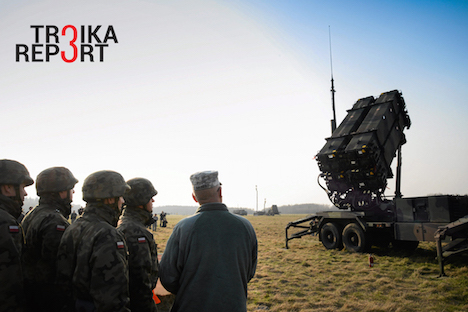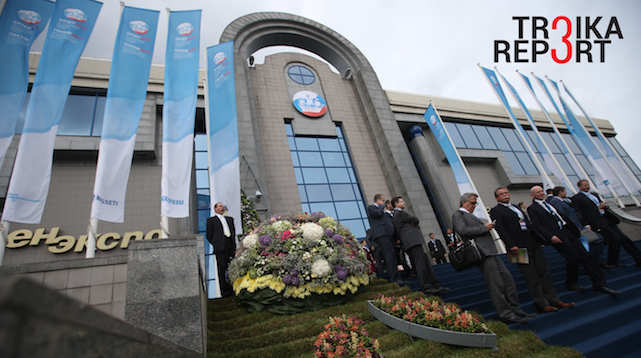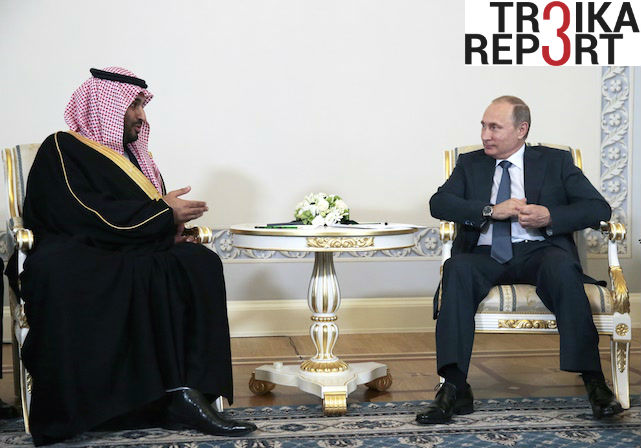

Polish and U.S soldiers look at a Patriot missile defense battery during joint exercises at military grouds in Sochaczew, near Warsaw, March 21, 2015. Source: Reuters
The trial balloon sent up this week by The New York Times, which reported of plans to station U.S. heavy weaponry in Eastern Europe, was met with serious concern and apprehension in Moscow. Experts approached by Troika Report also fear that it would drastically lower the threshold for a potential outbreak of hostilities between Russia and NATO in Europe.
The Russian Ministry of Defense was quick to announce that Moscow would retaliate by deploying Iskander tactical missiles in the Kaliningrad Region, and strengthen its joint task force in Belarus.
If approved, the U.S. proposal envisages storing armored personnel carriers and battle tanks in Lithuania, Latvia and Estonia, with similar equipment to be brought to Poland, Romania, Bulgaria and possibly Hungary. The total amount of military hardware on Russian borders would serve a contingent up to 5,000 American GIs.
This shift toward a more belligerent U.S. policy was welcomed by retired admiral and the former supreme allied commander of NATO, James G. Stavridis. His only complaint was that the proposed move did not go far enough, saying that “nothing is as good as troops stationed full-time on the ground.”
Nothing is written yet. The idea still needs Washington’s seal of approval, but Poland’s defense minister has claimed negotiations are already underway.
Stationing heavy weapons in Eastern Europe would most likely be viewed in Moscow as a breach of the NATO-Russia Act dated 1997 which specifically noted that neither of them “consider each other as adversaries” and that the North Atlantic Treaty Organization makes a commitment not to seek “additional permanent stationing of substantial ground combat forces” in countries neighboring Russia. However, the document has been subject to controversial interpretations ever since.
Yevgeny Buzhinsky, a retired two-star general and now chairman of the board of the Moscow-based PIR-center think tank, explained to Troika Report the essence of the divergence in views between Russia and NATO on the matter. According to Buzhinsky, the “significant increase” in stored military equipment in the region was viewed in Moscow as heavy weapons enough to arm one or two battalions, up to 2,000 soldiers. Actually, NATO never agreed to this ceiling, insisting the agreement allowed for a bigger build-up. Western signatories pointed out that the act was not legally binding and represented simply a political declaration, a sort of memorandum of understanding. Buzhinsky has a different opinion:
“In any treaty, irrespective of whether it is legally binding or politically binding, there is the letter and the spirit of the agreement. For the time being, the letter of the NATO-Russia Act is not violated, but the spirit is.”
What might be Moscow’s response? Vladimir Yevseyev, director of the Center of societal and political studies at the Russian Academy of Sciences, made his forecasts for Troika Report:
“Should the positioning of American heavy weapons take place, Moscow would be left with no other choice but to deploy offensive weapons and a rapid reaction task force. In case of war, these forces would be charged with the mission to destroy the military depots before the arrival of American GIs.
“It is evident that the disclosed plans will provoke Moscow to create a strike force. Basically, it will limit the barrier which is now preventing the use of force in general. As a result, the national security of the Baltic states, in particular, located in what is termed the “grey zone,” will be compromised, and they will become hostages to the tug of war between NATO and Russia.”
A contrasting viewpoint was voiced by Russian military expert Alexander Goltz, a critic of Kremlin policy, who placed the development into a wider context. Here is his short comment for Troika Report:
“I think we are moving into a completely different world where security is not based on mutual trust. This is a fact: Mutual trust has disappeared as a result of the events in Ukraine. Now security will be based on mutual military containment. Similar plans to deploy cruise missiles in Europe are also steps in the direction of creating military deterrents.”
Troika Report asked expert and former general Buzhinsky whether he subscribed to the opinion that relations between Russia and the West are ruptured for the next 10 years.
“Some people believe that it will take one to two generations to restore dialogue, and that is 30-40 years. I disagree. I think the West needs Russia and Russia needs the West. Apart from Ukraine, there are too many international problems that require our joint attention.”
The decision on whether to place U.S. heavy weapons in Eastern Europe has not yet been taken, but the stakes are genuinely high for both sides.

Preparations for SPIEF 2015 at the Lenexpo exhibition center. Source: Fadeichev Sergey / TASS
The annual St. Petersburg International Economic Forum (SPIEF) kicks off amid the ongoing confrontation between Russia and the West, a day after EU ministers agreed to prolong the sanctions against Moscow over its role in the Ukraine crisis to January 2016. Nevertheless, unlike last year, many European and even American corporate executives have chosen to attend the forum, although they are heavily outnumbered by entrepreneurs from Asia.
The overall representation of global business has exceeded that of 2014, when only 4,700 participants from 73 countries attended the forum. This year, a week before the opening of the forum, 5,072 confirmed applications had been registered.
Since 2006, the forum has been held under the auspices of the president of the Russian Federation, which has automatically added political overtones to either the participation or abstention of the “captains of industry” and investment moguls. This year has seen no real sin of a thaw in relations with the West, which is still engaged in a war of sanctions against Russia, and a further rapprochement with the new economic powers in Asia.
In a somewhat surprising move, the U.S. administration took a laissez faire attitude towards American business representatives who might wish to travel to Russia’s northern capital for the event. An unnamed U.S. diplomat was quoted in The Financial Times as saying: “The message is: If you’re asking us, we still won’t encourage you to go, but if you don’t ask, nothing will happen.”
The British newspaper The Financial Times interpreted it as “a softer approach in contrast to last year” when White House officials appealed to corporate bosses on behalf of U.S. President Barack Obama to shun what some called “Putin’s party.” Despite a slight change in the wind this time, U.S. business has remained reluctant to show up in force.
The underrepresentation of American business at the St. Petersburg Economic Forum is offset by a plethora of top executives from Asian companies, including Jack Ma, founder of China's largest e-commerce company, the Alibaba Group. As the second richest person in China (Ma sits in 33rd place in the Forbes global billionaires rating with a net worth of over $22 billion) and the epitome of a professional success story, Jack Ma will be guest speaker of honor at the event.
What is the appeal of the St. Petersburg forum for foreign business dignitaries? Finnish businessman Pekka Viljakainen, senior advisor to the president of the Skolkovo Foundation, spoketo Troika Report:
“I am a veteran of the St. Petersburg forum: It’s my seventh or eighth attendance. The forum is the right place to connect to the right people. There are a lot of Russian regional people, including governors. And there are international companies which are doing business in Russia or planning to do it. We as representatives of Skolkovo promote our high-tech incubator as an investment target. At the same time, we, and myself in particular, are searching for investment targets. All in all, the forum is a big melting pot where you can meet all the needed people in three days.”
— Is the Russian market still attractive for foreign investors?
“Yes, market size-wise, market growth-wise, technology-wise. But only when you have a consolidated pool of investors. The Russian market is interesting but there is uncertainty how the current situation will end up, when it will end up and what would be the resolution. There are co-investors which are hesitant to proceed. For investments, unclarity, uncertainty is bad. Yet it is a two-sided thing. I personally hope that the current situation of uncertainty would disappear and vanish in the coming months. I hope that all the parties would work on that.”
Europe’s “captains of industry” feature prominently at the forum. The European Union remains Russia’s third largest trading partner, with 2014 turnover standing at almost 300 billion euros. No wonder chief executives of European energy majors like Shell, BP and Total have not shunned the event.
There seems to be a growing awareness that the economic sacrifices in Europe necessary to support the sanctions are manifold and rather costly – a fact that Barack Obama has acknowledged – while the impact of the sanctions war on the U.S. is zero.
For instance, German technology giant Siemens and its French rival Alstom, which have a strong and time-honored presence in Russia, were understandably disappointed when the contract for the construction of a high-speed 480-mile line from Moscow to Kazan was awarded to a Chinese consortium.
The St. Petersburg International Economic Forum has revealed a stark contrast between politics and economics when it comes to the current turbulent relations between the West and Russia, proving that business people prefer to go not where policy barks but where money talks.

Deputy Crown Prince Mohammed bin Salman of Saudi Arabia (left) during the meeting with Russian President Vladimir Putin on June 18, 2015 in St. Petersburg. Source: Mikhail Metsel / TASS
The news that Prince Mohammed bin Salman, the rising star of Saudi royalty, is heading a delegation of businesspeople to attend the St. Petersburg International Economic Forum might understandingly raise eyebrows. The visit by the high-ranking envoy of the petroleum-rich kingdom, a long-time ally of the U.S., comes amid sanctions against Russia imposed by the West.
The significance of this diplomatic overture by Riyadh is underpinned by the personality of the prince. At the age of 29, Prince Mohammed, the eldest son of the king’s third and most recent wife, Fahda bint Falah bin Sultan, is young, especially by local yardsticks.
Yet, the new monarch, King Salman bin Abdulaziz, has chosen him as an indisputable favorite, promoting him to several top positions in the blink of an eye. Prince Mohammed has been placed in charge of the state oil monopoly, the public investment company, economic policy and, on top of it all, he is the minister of defense.
How should we interpret the visit by Prince Mohammed bin Salman to Russia, and does it send a potential signal of a possible unfreezing of the political dialogue between Moscow and Riyadh? Russian expert on the Middle East, Konstantin Dudarev, provided his comment to Troika Report:
“It seems to me that the visit to Russia of Mohammed bin Salman is most important. He is a very influential statesman who holds many of the highest positions in the kingdom: He is deputy crown prince, he is in charge of economic policy and he is also minister of defense. His visit corresponds to the Russian leadership’s decision to pivot to the East. The Middle East is very close to Russia geographically and this region is considered to be a very important element in Russian foreign policy.
“Cooperation between the two countries, which are producers and exporters of hydrocarbons, could produce a synergetic effect for both of them and stabilize the global oil market. No less important is that the peoples of the Middle East are suffering from several armed conflicts. In my opinion, Russia and Saudi Arabia should combine their efforts to prevent a further escalation of bloodshed and suffering. Since Russia has good relations with many countries in the region, this new element would help Moscow to become a major player, and bring peace and balance to this part of the world.”
In case the visit of the deputy crown prince produces signs of a positive attitude to re-engagement on both sides, it will give fresh impetus to relations, which have stalled since the breakthrough visit to Riyadh by Russian President Vladimir Putin in 2007. The positive momentum was later curtailed by the Arab Spring and the countries’ differing approaches to the civil war in Syria.
However, the two nations do have a history of business cooperation in the not-too-distant past. In 2004, Russian private oil company Lukoil signed a 40-year prospecting contract with Saudi Arabia’s state petroleum company Aramco, while Stroitransgas won a $100-million tender to build an oil pipeline in the Rub' al-Khali desert in the south of the country.
Troika Report sources have reported that, as part of Prince Mohammed’s participation in the St. Petersburg Economic Forum, several inter-governmental agreements will be signed, covering such areas as nuclear power generation, space exploration, and the kingdom’s link-up to the Russia-operated space-based satellite navigation system GLONASS. Additionally, MOUs will be included in the package, specifying cooperation in agriculture, residential housing development and utility services.
Economic matters apart, Prince Mohammed’s visit can also be seen as further proof that the West’s position on Russia is not dissuading other nations from engaging with Moscow, says Konstantin Dudarev:
“This is also another piece of evidence that the attempts of the United States and the European Union to isolate Russia from the world and demonize its leader are futile and doomed to fail.”
At present, Moscow and Riyadh are drawn towards each other by at least three factors. Firstly, the sectarian violence and the bellicose stance of the ISIS jihadists (the capital of the proposed Caliphate has been named as the Saudi city of Mecca), and the overall multiplication of challenges are making the whole region ungovernable. Secondly, Russia is on good terms with Saudi Arabia’s arch-rival Iran, which could be instrumental in finding a compromise for peace when the time comes. Thirdly, the United States has shifted its foreign policy focus to the Asia-Pacific region, moving to form closer ties with Iran, and appears to have no further interest in providing security guarantees for the Gulf monarchies.
But given the track record of estrangement between Russia and Saudi Arabia, there is enough reason to remain skeptical. It looks unlikely that the new power broker in the House of Saud could break the ice in St. Petersburg. Yet who really knows?
All rights reserved by Rossiyskaya Gazeta.
Subscribe
to our newsletter!
Get the week's best stories straight to your inbox